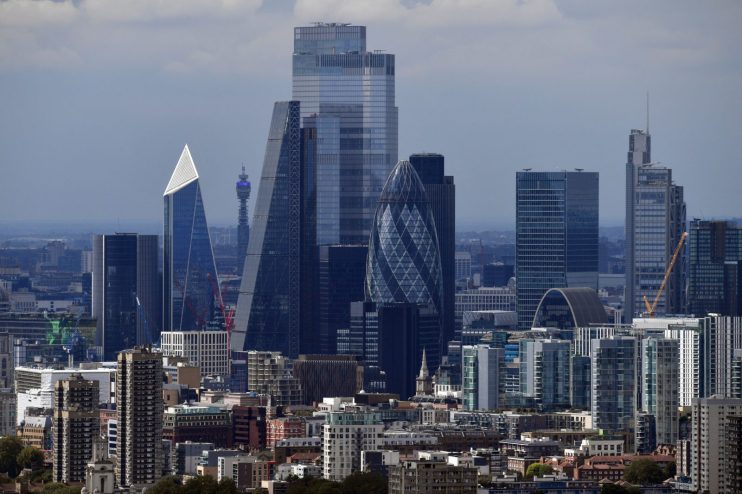Rishi Sunak announces post-Brexit outline for City of London

Rishi Sunak has outlined the City of London’s future after Brexit, which will aim to provide stability for EU financial services firms operating in the UK while also trying to open up the sector to more international markets.
Sunak said the Treasury today was unliterally publishing “a set of equivalence decisions for EU and EEA member states”, before Brussels makes a decision on future Europe access for City of London firms.
As it stands now, the UK’s financial services industry will lose its current access to EU markets on 1 January.
“I’m also publishing today a detailed framework for our approach to equivalence more generally,” Sunak said.
“We will use equivalence when it’s in the UK’s economic interest to do so.”
Sunak also announced the UK’s first long term asset fund “will be up and running within a year” and that from 2025 all “large companies and financial institutions across our economy” will have to disclose their carbon footprint.
The Treasury will also next year issue its first ever “sovereign green bond” – the first in a series of new issuances.
“We’re implementing a new green taxonomy, robustly classifying what we mean by green to help firms and investors better understand the impact of their investments on the environment,” he said.
The UK’s financial services industry and its future relationship with EU markets is separated from the current negotiations on a post-Brexit trade deal.
Before the Open newsletter: Start your day with the City View podcast and key market data
Brussels only grants access to its financial markets to non-EU countries if they are deemed to have similar regulations in a process known as equivalence.
The UK government submitted a series of regulatory equivalence assessments to the EU over summer in a bid to maintain access for the City of London.
The EU’s then commissioner for financial services Valdis Dombrovskis said earlier this year that EU member states had not come to terms with Brussels’ regulatory changes for the financial services sector, meaning it could take some time to secure market access for the UK.
“In some areas we will not be in a position to adopt equivalence decisions . . . not all EU parameters are in place in these areas,” Dombrovskis said.
“Implementing rules are not yet in place.”
Dombrovskis said at the time that the UK may have to broker arrangements with individual EU countries on financial services to ensure City of London firms do not completely lose access to mainland Europe on 1 January.
Investment Association boss Chris Cummings said he supported the chancellor taking a “technical approach not a political one” on equivalence.
“Today’s announcements will provide UK-based firms a degree of clarity regarding access to critical infrastructure post-Brexit, and all eyes will now be on the Commission to reciprocate in the interest of savers and investors across Europe.”
Barclays boss Jes Staley also welcomed the move: “An open, globally competitive financial centre is critical for building prosperity across the country and to help communities through uncertain times such as these. The Chancellor’s commitment today means we can keep on building what is a unique strength for the UK.”
Labour shadow chancellor Anneliese Dodds concentrated on the green initiatives in the chancellor’s statement in the House of Commons, saying they did not go far enough.
She called for the new 2025 green reporting rule for large companies to be brought forward to 2021-2022 and for further measures to be implemented.
“The UK produces one per cent of global emissions, but companies and financial institutions based her produce 15 per cent of those emissions,” she said.
“Will the chancellor immediately ban the financing of fossil fuel projects through UK export finance?”
Institute of Directors director of policy and corporate governance Dr Roger Barker said: “The problem is there’s a hundred and one different ways of measuring climate impact out there right now.
“It’s a confusing landscape for companies and investors alike, so bringing in common standards is absolutely the right thing to do.”